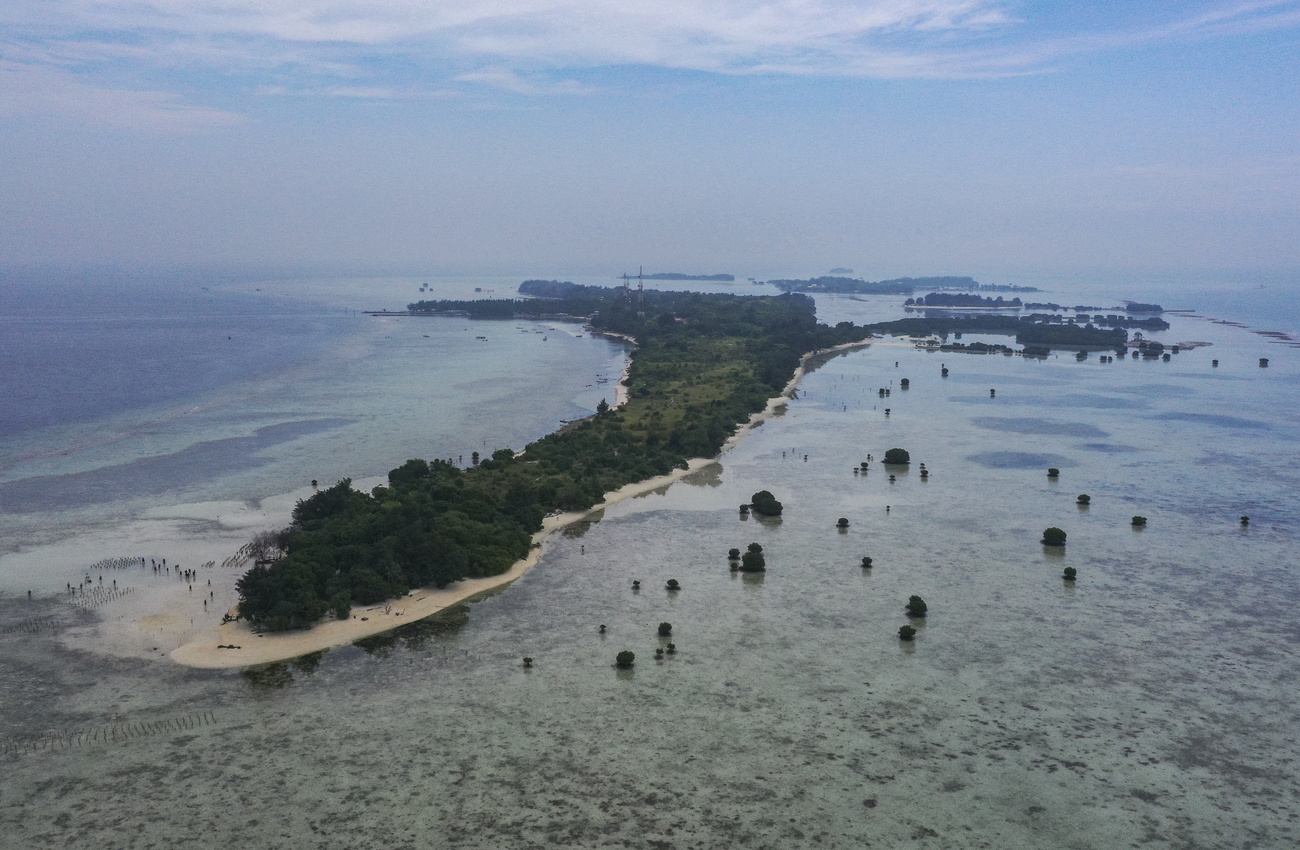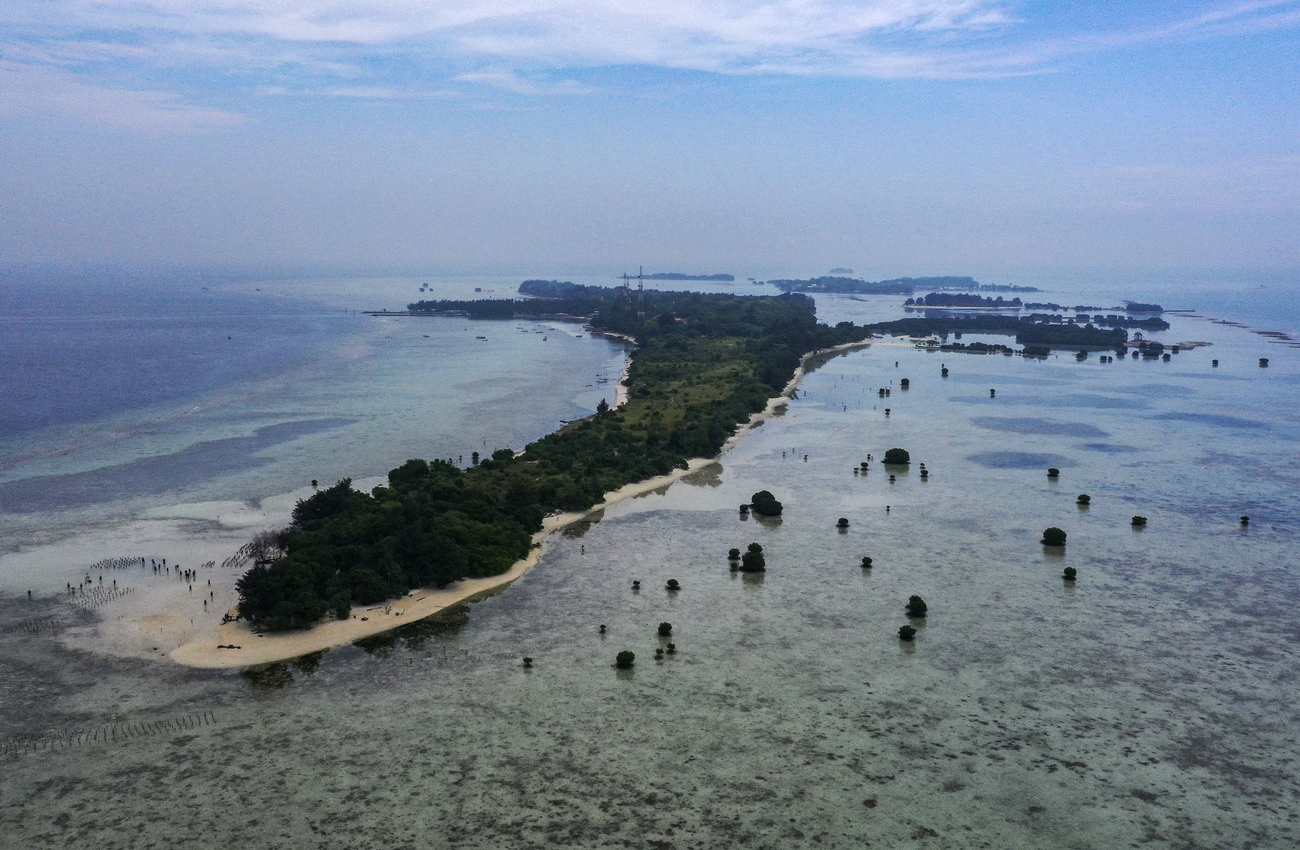How one Swiss lawyer is fighting for climate action in the courts

Nina Burri does not see herself as an activist. Yet the lawyer is taking on one of Switzerland’s biggest Swiss companies, the cement producer Holcim, with a climate lawsuit that may prove difficult to win.
The headquarters of HEKS, a Swiss church-based non-profit organisation, is rather bleak and barely stands out against the grey sky. More glamorous buildings may grace Zurich city centre, but they would not reflect the work done by HEKS. The organisation is getting on with the job of making the world a better place and is committed to the fight against climate change.
So is Nina Burri. The lawyer is currently working on a file which, if all goes to plan, could shake up legal practice. The other possibility is disillusionment, coupled with high legal costs.
Burri may not be a run-of-the-mill climate activist, but she has always believed in fighting for a cause. As a teenager she wanted to become a war correspondent, while in later years, the battle for justice helped shape her career. She ended up working in international criminal law and prosecuted war criminals for the International Criminal Court in The Hague.
When travelling abroad to check facts for her legal cases, Burri met war crime survivors. “The gap between suffering and prosperity was hard to bear sometimes,” she remembers. But her experiences did not leave her bitter. Burri is warm and engaged, her voice soft and relaxed as she walks us to a small meeting room at the HEKS headquarters.
Today, the 39-year-old teaches international law at the University of St. Gallen. She is a highly qualified lawyer and, like her opponents in the climate case against Holcim, she could probably find a job in a flashy law firm inside Zurich’s Prime Tower. However, Burri has opted for the other side.
“I have realised how urgent the climate question is,” she says. When she tells us about the case she is currently working on, Burri suddenly becomes thoughtful and lowers her voice. On behalf of HEKS, she is helping four residents of the Indonesian island of Pari to claim damages from the Swiss cement producer Holcim, which they claim is one of the major emitters of CO2 in the world. She is also trying to force the company to commit to lower CO2 emissions in the future.
Risky lawsuit
The lawsuit focuses on historical flood damage as well as the imminent threat of flooding that the entire island faces. The claimants hold rising sea levels and atmospheric changes responsible for more frequent and extreme floods, which they say is related to Holcim’s cement productionExternal link.
The logic behind this lawsuit is anything but straightforward. Because the cement company is responsible for 0.42% of all industrial greenhouse gas emissions, Burri and her partners argue that it must pay for the same share of the damage done on Pari. The Climate Accountability Institute in the United States has worked out the exact percentage of 0.42 for HEKS.
The emissions did not occur locally but in several other countries and over the course of several years. Holcim does not operate on Pari, where the claimants live, and there is not a single Holcim plant left in Indonesia. Four years ago, the cement giant withdrew from IndonesiaExternal link altogether.
Historic emissions
Claiming damages for historic emissions is unprecedented. On its website, HEKS dubs this legal action a “ground-breaking case” as it targets past and future emissions, which is radical. Demands to co-finance flood protection measures and to limit future emissions are precedents.

“It will be a long and bumpy road,” says Burri. Her legal experience includes a stint at a court in canton Zurich, so she is familiar with the process and hurdles associated with such cases. “In civil lawsuits, the risks for the plaintiff are very high,” she is quoted as saying in an article by news outlet Republik in October 2020. At the time, a popular initiative aimed at holding Swiss companies accountable for their actions abroad was fuelling controversy in Switzerland.
Critics of the so-called Responsible Business Initiative, which was eventually rejected by voters, argued that holding companies liable in Swiss courts for abuses committed in other countries was too far-reaching. But Burri responded that non-governmental organisations would weigh up the evidence carefully before filing a lawsuit. “A negative precedent would certainly not be in our interest,” she told Republik.
‘Climate change is not political’
So why is Burri pushing ahead with a case that will be almost impossible to win? Is the procedure not politically motivated and only aimed at naming and shaming an individual company? “The climate is not political, and neither is climate change – it is a real problem that is scientifically proven,” she says firmly.
Her point is that the climate crisis affects more and more aspects of life and thus more areas of law, and that it is up to the courts to adapt the legal system to this new reality. Her mission may sound brave, but Burri seems to know what she wants. She is driven, undaunted and full of optimism.
But she also knows what she does not want, and that is to be considered an activist. “We help people whose living conditions have been badly damaged and whose futures are at stake,” she explains. “In liability cases, it’s very common that the victims take legal action against a person or an entity that contributed to the damage.” It is also no longer an exception that such cases become international matters.
“Theoretically, we could sue several companies that have contributed to climate change,” says Burri, adding that Holcim was at the centre of attention as CO2 emissions are extremely high in cement production.
“Holcim is by far the biggest polluter in Switzerland and has been for decades,” she says. “That’s why this lawsuit makes a difference. Oil and gas companies are the first to come under fire, but now we have to look at the cement industry.”
A deliberate act
But what does Burri’s strategy look like? “The managers of the company acted deliberately and knew what they were doing,” she says. “Since the 1970s, people in the cement industry have been aware that cement production emits tremendous amounts of CO2 and that this hugely contributes to climate change.”
It has also been widely known across the industry for several decades that global warming causes significant damage to the environment. Burri argues that the company should have changed its conduct even though its acts were not illegal. “It’s like being in traffic,” says Burri. “You can move around legally, but if you cause deliberate damage, you are held accountable.” As soon as she talks about legal matters, she chooses her words very carefully.

At the end of the day, the lawsuit is about cutting emissions quickly and in absolute terms to reach the 1.5°C target set by the 2015 Paris climate agreement. “Time is running out,” warns Burri, pointing out that this is a strategic case, and not a symbolic one. “There can’t be a legal vacuum on climate change.”
Despite all of her reservations, Burri does not want to condemn companies in general. She hopes that the private sector will come up with sustainable solutions against climate change, and even has some good things to say about Holcim. She points out that the company had a climate strategy, did better than other cement producers, and responded to HEKS’ questions before the trial.
But she has a plea: “Holcim sees itself as a leader in the industry, and it must do better. They left it far too late to tackle the emissions problem, and we still don’t do enough.” She also believes that the company has sufficient funds to make a change.
“The climate crisis is one of the biggest threats to human rights of our time,” says Burri, who finds it unacceptable that there is no legal avenue to redress these. Getting the courts to see it that way too is a big part of Burri’s fight. It’s work she’s happy to do inside the bleak HEKS building. The glimmering Prime Tower in Zurich, on the other hand, is where the other Switzerland works.
Edited by Balz Rigendinger
Adapted from German by Billi Bierling/gw
*Ariane Lüthi is a former diplomat who also previously worked for Holcim as a human rights specialist. She has been a journalist since 2020.

In compliance with the JTI standards
More: SWI swissinfo.ch certified by the Journalism Trust Initiative









You can find an overview of ongoing debates with our journalists here . Please join us!
If you want to start a conversation about a topic raised in this article or want to report factual errors, email us at english@swissinfo.ch.